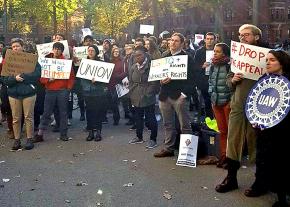Harvard’s greed is showing
reports on a protest by Harvard graduate student workers and supporters against the university's attempts at union busting.
MORE THAN 200 graduate and undergraduate students, workers and community members rallied in Harvard Yard November 8 to condemn Harvard University's union-busting campaign against graduate students.
Last November, Harvard students lost a vote to organize their campus under the banner of the Harvard Graduate Students Union-United Auto Workers (HGSU-UAW). However, the university had failed to provide organizers with a complete list of students eligible to vote, illegally obstructing the unionization effort by omitting over 500 eligible students from the voting list.
Student organizers were able to secure approval from the National Labor Relations Board (NLRB) for a revote after proving Harvard's deception.
In response, the university has filed an appeal, claiming that leaving out 500 names doesn't warrant a new election. A ruling in Harvard's favor would set a dangerous precedent for future attacks on workers attempting to organize everywhere, including campuses.
PROTESTERS GATHERED at the statue of John Harvard in Harvard Yard, displaying a massive petition with over 1,000 signatures. The petition read, in part:

The decision to appeal this ruling not only undermines the Harvard students' right to a fair union election, but also threatens fair union elections for all U.S. workers and weakens workplace democracy. At a time when so many of the basic protections Americans have taken for granted are in jeopardy, we ask that Harvard not further empower anti-worker and anti-democratic forces.
We, the undersigned members of the Harvard community and the surrounding communities impacted by Harvard's actions, call upon Harvard University to respect the law and set an example in promoting the rights and protections of students, workers and democracy.
Student organizers and supporters spoke out to condemn Harvard's union busting, and connected the struggle for union representation on their campus to the fight of all working people organizing against attacks on unions and labor.
The first speaker, graduate employee Niharika Singh, criticized Harvard for "devaluing the work that we do by arguing in federal court that student workers are not workers."
Singh spoke to the climate of attacks on working people by the Trump administration, connecting it to the organizing drive: "We want the Harvard administration to drop this appeal, hold an election and work with us during these tough political times to fight back against the relentless attacks on everything we hold dear."
The next speaker, Amelia Goldberg, an undergraduate organizer with student group Our Harvard Can Do Better, connected the efforts of students to organize with the fight to end sexual assault and harassment on campuses. She told the crowd:
[W]e know Harvard's not going to change on its own. That's why students and student workers organize against the injustices we're experiencing. This kind of local organizing and policy-making is vital, and it's more important than ever right now, as the federal government works to develop new Title IX rules and regulations, which we know will roll back critical protections for students and survivors.
More speakers connected the graduate student organizing drive to the fight against oppression in all forms, including the fight for LGBT rights and immigrant justice.
One speaker expressed frustration at the Harvard's lackluster track record on immigrant justice and defending members of the community who are especially vulnerable to attacks from the top.
"Do workers in dining halls in our buildings feel respected by the institution when it fails to provide adequate health care and a livable wage?" the speaker asked. "What about when the only legal resources readily available to those facing immigration concerns are in English and no other language? When the answer to decades of organizing around diversity issues is another committee?"
Cherrie Bucknor, a first-year PhD student in the sociology department, said in an interview:
As a union member and union researcher, I have seen how unions can make a difference in the lives of workers. I attended the rally because I strongly support workers' rights and want the Harvard administration to drop its appeal.
One of the most fundamental rights that workers have is the right to collectively bargain. This is severely impacted when a fair and accurate list is not provided during a union election. Appealing the NLRB decision would set a dangerous precedent for future unionization efforts across the country and undermine workers' rights.
It felt great to be among a group of people who support unionization. I think it's important to sign petitions and show up for solidarity actions like rallies so that the administration and the community at large can see that there are thousands of people who are behind this effort. Hopefully, there will be enough pressure to get them to drop the appeal.
After the confident and politically energized rally, demonstrators marched with the petition to deliver it to a campus administrator, chanting, "Stop the hypocrisy, labor is democracy!" and "Hey, Harvard, you can't hide, we can see your greedy side!"
As attacks on working people across the country intensify, struggles like the one at Harvard can set a radical example of the kind of solidarity necessary to protect workers' rights--and lead to students and workers having the organizations and experience necessary to stand up for their rights and the rights of people everywhere.


